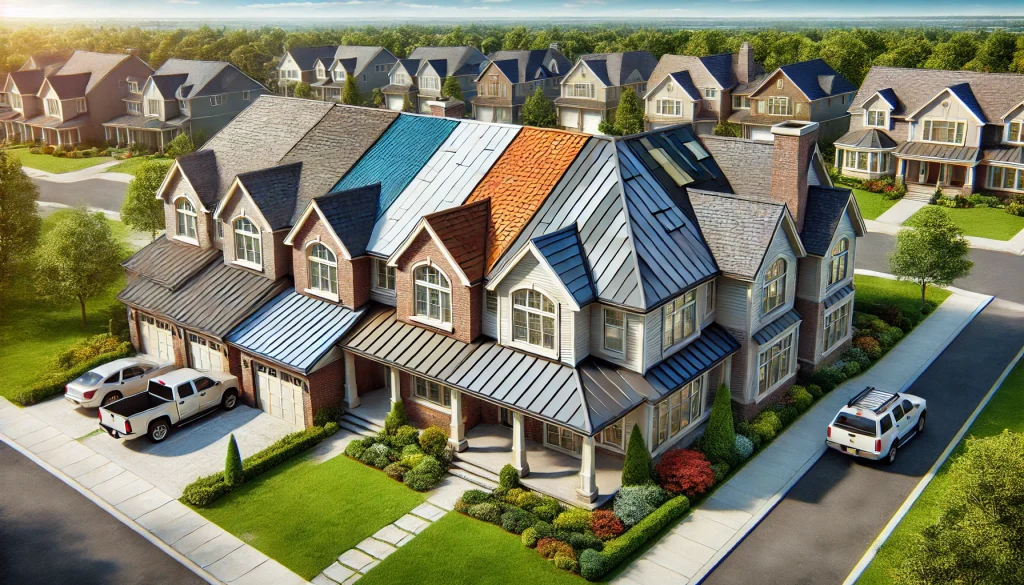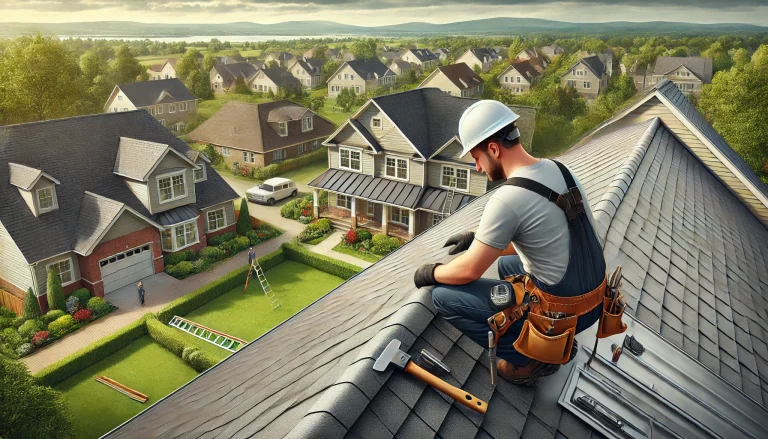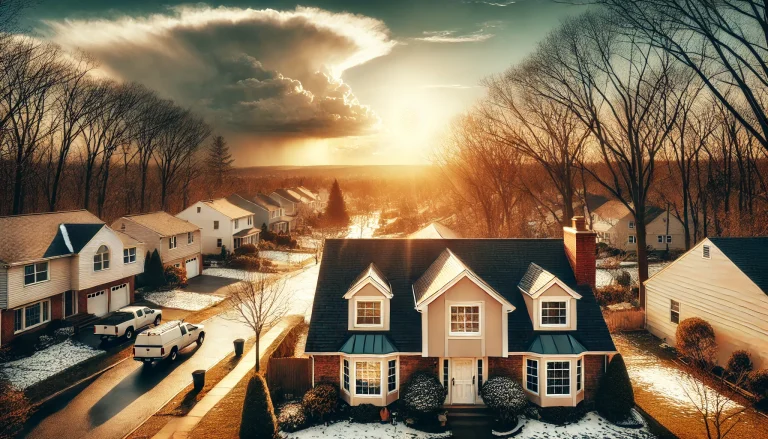For homeowners in the Garden State, understanding the lifespan of your roof is crucial for both home protection and financial planning. New Jersey’s diverse climate, ranging from humid summers to harsh winters, presents unique challenges for roofing systems. This comprehensive guide will explore the factors influencing roof longevity in New Jersey, helping you make informed decisions about your home’s most important protective feature.
Factors Affecting Roof Longevity in New Jersey
The durability of your roof depends on several interconnected factors, each playing a vital role in determining how long your roof will effectively protect your home.
Climate Impact on Roofs
New Jersey’s climate is a significant determinant of roof lifespan. The state experiences:
- Hot, humid summers with temperatures often exceeding 90°F
- Cold winters with frequent freezing temperatures and snowfall
- Spring and fall seasons marked by heavy rains and occasional storms
This varied weather pattern subjects roofing materials to:
- Thermal shock from rapid temperature changes
- UV radiation damage during summer months
- Moisture accumulation and potential ice dam formation in winter
- Wind damage from coastal storms and nor’easters
These climate factors can accelerate the aging process of roofing materials, making regular maintenance crucial for extending roof life.
Roofing Materials Commonly Used in NJ
The choice of roofing material significantly influences longevity. In New Jersey, popular options include:
- Asphalt Shingles: The most common choice due to affordability and decent durability.
- 3-tab shingles: 15-20 years
- Architectural shingles: 20-30 years
- Metal Roofing: Gaining popularity for its longevity and energy efficiency.
- Steel: 40-70 years
- Aluminum: 50+ years
- Copper or zinc: 70+ years
- Slate: Known for its exceptional durability and aesthetic appeal.
- Natural slate: 75-100 years or more
- Synthetic slate: 40-60 years
- Tile (Clay or Concrete): Excellent for withstanding harsh weather conditions.
- Lifespan: 50-100 years
- Wood Shakes: Offers a natural look but requires more maintenance.
- Lifespan: 20-30 years with proper care
Each material has its own set of pros and cons, and the right choice depends on factors like budget, aesthetic preferences, and long-term durability needs.
Roof Installation Quality
The quality of installation is paramount in determining a roof’s lifespan. A poorly installed roof, regardless of material quality, will have a significantly shorter lifespan. Key aspects of quality installation include:
- Proper underlayment application
- Correct nailing techniques
- Adequate ventilation system installation
- Proper flashing around chimneys, vents, and other roof penetrations
Professional installation by experienced New Jersey roofing contractors is crucial for maximizing your roof’s durability and performance.
Maintenance Practices
Regular maintenance can dramatically extend your roof’s life. A comprehensive maintenance routine should include:
- Bi-annual inspections (spring and fall)
- Cleaning gutters and downspouts
- Removing debris from the roof surface
- Checking for and repairing loose or damaged shingles
- Inspecting and maintaining proper attic ventilation
- Addressing minor issues before they escalate into major problems
Proactive maintenance can add years to your roof’s lifespan and prevent costly repairs down the line.
Average Lifespan of Different Roofing Materials in New Jersey
Understanding the expected lifespan of various roofing materials in New Jersey’s specific climate can help homeowners make informed decisions about roof replacement and maintenance.
Asphalt Shingles Lifespan
Asphalt shingles remain the most popular roofing material in New Jersey due to their cost-effectiveness and relatively good performance in varied climates.
- 3-tab shingles: These economical options typically last 15-20 years in New Jersey’s climate. However, they may require replacement sooner in areas exposed to harsh coastal conditions or heavy tree coverage.
- Architectural shingles: With their improved durability and wind resistance, architectural shingles can last 20-30 years in New Jersey. Some premium brands even offer warranties up to 50 years.
Factors affecting asphalt shingle lifespan in NJ:
- Quality of installation
- Color (darker shingles may age faster due to heat absorption)
- Slope of the roof (steeper slopes tend to last longer)
- Attic ventilation quality
Metal Roof Durability
Metal roofing has gained popularity in New Jersey for its longevity, energy efficiency, and ability to withstand extreme weather conditions.
- Steel roofs: Expect a lifespan of 40-70 years. Galvanized or galvalume coatings provide additional protection against rust.
- Aluminum roofs: These can last 50+ years and are particularly suitable for coastal areas due to their corrosion resistance.
- Copper or zinc roofs: These premium options can protect your home for 70+ years or even a century with proper maintenance.
Benefits of metal roofs in NJ’s climate:
- Excellent snow shedding capabilities
- High wind resistance
- Energy efficiency, reflecting solar radiation in summer
Other Materials
- Slate roofs: Natural slate can last 75-100 years or more, making it one of the most durable roofing options for New Jersey homes. Its ability to withstand freezing temperatures and heavy snow loads makes it ideal for NJ winters.
- Clay or concrete tiles: With a lifespan of 50-100 years, these materials offer excellent durability. They perform well in New Jersey’s freeze-thaw cycles but may require additional structural support due to their weight.
- Wood shakes: While beautiful, wood shakes require more maintenance in New Jersey’s climate. With proper care, including regular treatments against moisture and insects, they can last 20-30 years.
Signs of Roof Aging in New Jersey Homes
Recognizing the signs of an aging roof can help homeowners address issues before they lead to significant damage. In New Jersey’s climate, be on the lookout for these indicators:
Visual Indicators
- Curling or missing shingles: Heat and moisture can cause shingles to curl at the edges or corners. Missing shingles leave your roof vulnerable to leaks.
- Granules in gutters: As asphalt shingles age, they shed granules. If you notice an accumulation in your gutters, it’s a sign your roof is deteriorating.
- Visible sagging: A sagging roofline can indicate structural issues, often caused by long-term water damage or poor ventilation.
- Daylight through roof boards: Check your attic for any spots where daylight is visible through the roof boards. This is a clear sign of holes or severe deterioration.
- Algae or moss growth: While sometimes just a cosmetic issue, extensive growth can trap moisture and accelerate shingle deterioration.
Structural Signs
- Leaks in the attic: After heavy rain or snowmelt, check your attic for signs of water infiltration.
- Water stains on ceilings or walls: These can indicate a leak that may have been ongoing for some time.
- Paint blistering on interior walls: Moisture seeping through the roof can cause interior paint to bubble or blister.
- Exterior paint peeling: Moisture escaping through the roof can also affect exterior paint near the roofline.
Energy Efficiency Changes
- Unexplained increases in heating or cooling costs: A failing roof can lead to poor insulation, causing your HVAC system to work harder.
- Uneven temperatures throughout the house: This could indicate that certain areas of your roof are allowing more heat transfer than others.
How Weather Conditions in New Jersey Affect Roof Lifespan
New Jersey’s diverse climate presents a range of challenges for roofing systems throughout the year.
Seasonal Roof Damage
- Summer:
- UV rays can cause shingles to crack, warp, or fade
- High temperatures accelerate the breakdown of roofing materials
- Sudden summer thunderstorms can lead to wind damage or water infiltration
- Fall:
- Falling leaves can clog gutters and downspouts, leading to water backup and potential ice dam formation
- Acorns and small branches can damage shingles on impact
- Winter:
- Snow accumulation adds significant weight stress to the roof structure
- Freeze-thaw cycles can cause expansion and contraction, leading to cracks
- Ice dams can form, forcing water under shingles and into the home
- Spring:
- Heavy rains can expose any weaknesses in the roofing system
- Rapid temperature changes can cause materials to expand and contract quickly
Extreme Weather Events
New Jersey is no stranger to severe weather, which can dramatically impact roof lifespan:
- Hurricanes and tropical storms: High winds can lift and remove shingles, while heavy rains can overwhelm drainage systems.
- Nor’easters: These powerful storms combine heavy precipitation with strong winds, testing the limits of roofing systems.
- Severe thunderstorms: Hail and wind damage from these storms can significantly shorten a roof’s lifespan.
Temperature Fluctuations
The freeze-thaw cycle in New Jersey is particularly hard on roofing materials:
- Water can seep into small cracks or under shingles, then freeze and expand, widening the cracks
- This cycle, repeated throughout winter and early spring, can lead to significant damage over time
- Materials like metal and slate handle these fluctuations better than asphalt shingles
Extending Your NJ Roof’s Lifespan
Proactive measures can significantly increase your roof’s longevity in New Jersey’s challenging climate.
Regular Roof Inspections
- Schedule professional inspections at least once a year, ideally in the fall before winter sets in
- After severe weather events, have your roof checked for damage
- Look for a NJ roofing contractor with experience in local weather conditions
Proper Attic Ventilation
Good attic ventilation is crucial for roof longevity in New Jersey:
- It regulates temperature and moisture levels, preventing premature aging of roofing materials
- Proper ventilation can prevent ice dam formation in winter
- It can lower cooling costs in summer by reducing heat buildup
Ensure your attic has:
- Sufficient intake vents (usually in the soffits)
- Adequate exhaust vents (ridge vents or other types near the roof peak)
- Proper insulation to prevent heat transfer from living spaces
Timely Roof Repairs
Addressing minor issues promptly can prevent them from escalating into major problems:
- Replace missing or damaged shingles immediately
- Repair flashing around chimneys, vents, and other penetrations at the first sign of wear
- Address any signs of water infiltration as soon as they’re noticed
Roof Repair vs Replacement: Making the Right Choice
When faced with roofing issues, New Jersey homeowners must decide between repair and replacement.
Cost Considerations
- While repairs are less expensive in the short term, frequent repairs on an aging roof can exceed the cost of replacement over time
- Consider the roof’s current age and the cost of repairs versus the cost of a new roof
- Factor in potential energy savings from a new, more efficient roofing system
Remaining Lifespan Evaluation
- If your roof is nearing the end of its expected lifespan, replacement might be more cost-effective
- Consider the overall condition of the roof – if problems are widespread, replacement is often the better choice
- Evaluate the performance of the roof in recent extreme weather events
Energy-Efficient Roofing Options
When considering replacement, look into energy-efficient options:
- Cool roofs that reflect more sunlight and absorb less heat
- Solar tiles that can generate electricity
- Green roofs that provide insulation and manage stormwater
These options may have higher upfront costs but can provide long-term savings and environmental benefits.
Choosing Professional Roofing Contractors in New Jersey
Selecting the right contractor is crucial for ensuring your roof’s longevity and performance.
Importance of Expert Installation
- Professional installation is key to maximizing your roof’s lifespan
- Look for contractors with extensive experience in New Jersey’s climate
- Ensure they’re familiar with local building codes and regulations
Checking Credentials and Reviews
- Verify that the contractor is licensed and insured in New Jersey
- Check for membership in professional organizations like the National Roofing Contractors Association
- Read reviews from local customers and ask for references
Understanding Roof Warranties
A quality contractor will offer robust warranties:
- Manufacturer’s warranty on materials
- Workmanship warranty from the contractor
- Understand what’s covered and for how long
- Know what actions might void the warranty
New Jersey Roof Replacement Timeline
Planning ahead for roof replacement can save both money and stress.
When to Start Planning
- Begin planning for replacement when your roof reaches about 80% of its expected lifespan
- Start saving or exploring financing options well in advance
- Research materials and contractors before your roof reaches critical condition
Best Seasons for Roof Work in NJ
- Late spring to early fall is generally the best time for roof work in New Jersey
- Avoid the extreme temperatures and precipitation of winter
- Be aware that summer can be the busiest season for roofers, so book early
Conclusion
The life expectancy of a roof in New Jersey varies widely based on materials, installation quality, maintenance, and local weather conditions. While asphalt shingles might last 20-30 years, more durable materials like metal or slate can protect your home for 50 years or more. Regular maintenance, timely repairs, and choosing the right materials for New Jersey’s climate are key to maximizing your roof’s lifespan.
Remember, your roof is a significant investment in your home’s protection and value. By understanding the factors that affect its longevity and taking proactive steps to maintain it, you can ensure that your New Jersey home stays safe and dry for decades to come. Whether you’re dealing with the coastal conditions of the Jersey Shore or the varied weather of the inland regions, a well-maintained roof is your home’s first line of defense against the elements.
FAQs about Roof Lifespan in New Jersey
- Q: How often should I have my roof inspected in New Jersey?
A: It’s recommended to have your roof professionally inspected at least once a year, ideally in the fall before winter weather sets in. Additionally, schedule an inspection after any major storm events. - Q: Can I extend the life of my asphalt shingle roof in New Jersey?
A: Yes, you can extend your roof’s lifespan through regular maintenance, prompt repairs, ensuring proper attic ventilation, and keeping your roof clean from debris. Professional inspections can catch issues early, potentially adding years to your roof’s life. - Q: Are metal roofs a good choice for New Jersey homes?
A: Metal roofs are an excellent choice for New Jersey due to their durability, longevity, and ability to withstand extreme weather conditions. They perform well in both summer heat and winter snow, and their long lifespan often justifies the higher initial cost. - Q: How do I know if I need a roof repair or a full replacement?
A: If your roof is relatively new and the damage is localized, a repair might suffice. However, if your roof is nearing the end of its expected lifespan, has widespread issues, or has been repaired multiple times, replacement is often more cost-effective. A professional inspection can help you make this decision. - Q: Does the color of my roof affect its lifespan in New Jersey?
A: While not a primary factor, lighter-colored roofs can reflect more sunlight, potentially reducing heat absorption and slightly extending the roof’s lifespan in New Jersey’s climate. However, proper ventilation and quality materials are more significant factors in roof longevity.



